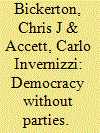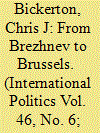| Srl | Item |
| 1 |
ID:
130946


|
|
|
|
|
| Publication |
2014.
|
| Summary/Abstract |
This article looks at the legacy of 'Berlusconism' for Italian politics. On the right, we identify a process of fragmentation. As a result of the personalised leadership of Silvio Berlusconi, where loyalties and ties were to il cavaliere as an individual rather than to a party or a political tradition, there is little by way of legacy on the right. Surprisingly, we find that Berlusconi's greatest legacy lies on the left of Italian politics, in the figure of Matteo Renzi. In his savvy manipulation of the media and in the careful construction of his own image, accompanied by a non-ideological set of political slogans, Renzi has gone even further than Berlusconi. As a result, he may be the one to final bury Italian 'party government' and all its associated traditions and ideals.
|
|
|
|
|
|
|
|
|
|
|
|
|
|
|
|
| 2 |
ID:
091437


|
|
|
|
|
| Publication |
2009.
|
| Summary/Abstract |
The year 1989 is widely fêted as a turning point in the history of Eastern Europe: nation-states were liberated from the tyranny of Soviet rule and regained their sovereign independence. This article challenges the conventional wisdom by arguing that the 'limited sovereignty' of the pre-1989 period, formally declared by Leonid Brezhnev in 1968, has been replaced by a new form of domination, this time from Brussels. However, while Eastern European states still face constraints on their political autonomy and self-government, the nature of this domination is different. Specifically, it coincides with the post-Cold War revision of the concept of sovereignty itself, where the attachment to the formal rights of sovereign independence and equality is lost. Eastern European states have found that continued limitations upon their sovereignty are today celebrated as the realization of the essence of sovereignty itself.
|
|
|
|
|
|
|
|
|
|
|
|
|
|
|
|